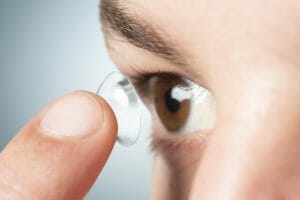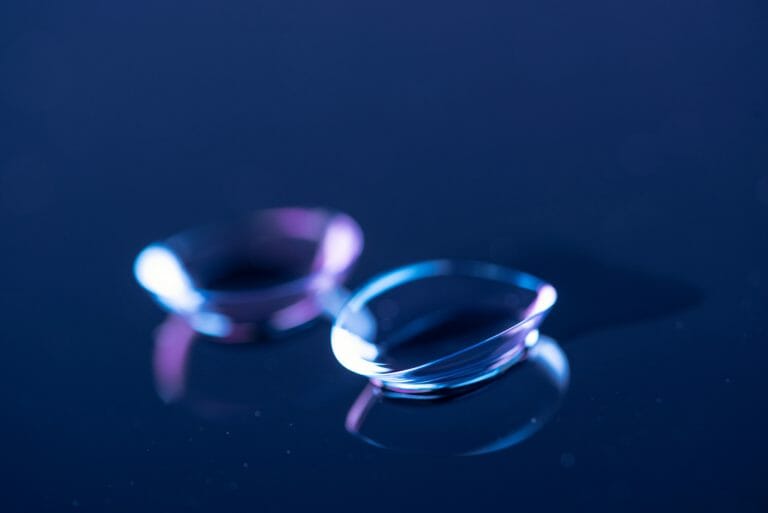Deciding between daily and monthly contact lenses can be challenging. However, taking a look at their pros and cons can help you make the decision between the two easily. Let’s take a look at the advantages and disadvantages of daily and monthly contacts one by one.
Pros of the Daily Contacts
As the name suggests, daily disposable contact lenses are the lenses that you use only once and throw them away at the end of the day. Following are some of the pros of daily contacts or dailies.
Easier to Handle
Daily disposables will save you time as they do not require cleaning, disinfecting, buying lens solutions for them, and storing in the case. It can be way more convenient if you are a frequent traveler.
Reduce the Risk of Complications
If you have eye conditions like allergies or dry eyes, daily contact lenses are the best option. Unlike other contact lenses, they do not accumulate build-up as they are discarded within a day.
If you take off your daily disposables for a nap or for swimming, you should store them in contact lens solutions like RevitaLens, Biotrue, Opti-free Pure Moist, or any other solution recommended by your eye doctor.
Simple Wear Schedule

Dailies have and done wear schedule; put in a pair of contact lenses at the start of the day and dispose of them after use before going to bed. You will not have to worry about lens solutions and cases.
Best for Beginners, Younger Patients, and Infrequent Wearers
Though daily disposables are great for all lens-wearers, beginners and younger contacts can benefit from them greatly as they have the risk of tearing, ripping, and losing a lens.
In addition, the infrequent wearers like the more flexible wearing schedule as they keep switching between contact lenses and glasses.
Cons of the Daily Contact Lenses
They are More Expensive
Daily disposables cost more than monthly. However, there is not much difference between the total cost if you include the cost of saline solutions, cases, and the potential eye conditions that monthly can cause. Therefore, dailies are as cost-effective as monthlies if you consider contact lens maintenance and rebates.
Sleeping while Wearing Daily Contacts Can Be Harmful
Daily contacts are not FDA approved to fall in. They are not designed for that. There are certain types of lenses that you can sleep in, but you have to use them under the guideline of your eye care practitioner.
Dailies are Less Environment Friendly
You will pile up more trash if you are throwing away lenses every day instead of after months.
Some manufacturers of daily disposable contact lenses have a recycling program. It allows you to decrease the waste of disposed of daily contacts.
Daily Contacts are Easy to Break
Daily disposable lenses are made of a thinner material than monthlies. Therefore, you have to be a little more careful when handling these lenses.
Pros of Monthly Contacts

Now that you know the advantages and disadvantages of daily contact lenses let’s now know about the pros and cons of monthly disposable contact lenses. As the name suggests, you can wear them every day for a specific number of months and then throw them away. Following are the pros of the Monthly disposable contact lenses.
They are Less Expensive
They are less expensive if you take good care of them and do not get your eyes infected. If you take care of them and follow your eye doctor’s directions, you will not have any kind of eye complication that can take a lot of money.
However, monthly use lenses may cost you more money in the long run, with the cost of lens solution and other related costs.
Some Monthly Contacts are FDA Approved to Fall Asleep in
Sleeping while wearing contact lenses can be harmful; therefore, it is not recommended. It increases the risk of eye infection.
It might be less harmful if you forget to take off the monthly lenses before falling asleep than the daily ones.
They are More Environment Friendly
Monthly contact lenses do not pile up the garbage as quickly as the dailies as you dispose of them after months. Moreover, they have less packaging waste.
They are More Breathable
Monthlies are made of a material that allows more oxygen to your eyes. Therefore, they have a longer wear cycle, and some monthly contacts are approved by the FDA to sleep in.
Cons of Monthly Contact Lenses
They Need a Lot of Care
As monthly contact lenses last for a long time, they tend to accumulate more mucus, films, fungus, and other similar impurities. It increases the risk of complications, which can get worse if you have dry eyes or allergies.
They Run the Risk to be Overworn
When you are using a contact lens for months, it is easy to forget when they need replacement. You have to set a reminder on your phone and write the expiry date on the contact lens case to remind you of the date. It is practical, simple, and improves replacement compliance.
They Can be More Expensive if You Rip or Lose Them
Monthly lenses are hard to rip, but they are more expensive. You have to buy them before their expiry date. That is why beginners and teenagers are recommended to use daily disposables.
It seems that though daily disposables are expensive, they are more suitable healthwise. A year’s supply of dailies can be a couple of tens of thousands more than monthly contacts. But the health benefits of daily disposables outweigh the monthly lenses.
Both monthly and daily contacts have their pros and cons. If you look for hassle-free, hygienic, and comfortable options, you should go with daily disposables. And, if you have budget concerns, or you are afraid that you might fall asleep in contact lenses someday, consider the monthly disposable contact lenses.
You must discuss these options with your eye care practitioner as he can tell you the best option according to your unique eye condition.


